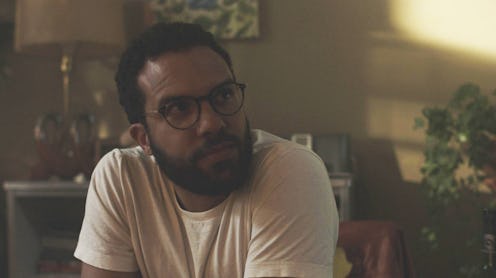
With apologies to your YA book group, neither The Hunger Games nor Divergent invented the dystopian future. Many novels, films, and television shows have imagined an end to life as you know it and the beginning of a new and more dangerous one. In 1985, Margaret Atwood's novel The Handmaid's Tale was published; in 2017, the television adaptation is debuting on Hulu, starring Elisabeth Moss as Offred (formerly June) — a member of the handmaid class trying to escape servitude and be reunited with her family. Much has been made of the idea that the subject matter is eerily timely, with in-power Republican lawmakers vowing to defund Planned Parenthood and reverse Row V. Wade. But according to O-T Fagbenle, who plays June's husband, Luke, in the series, the timing was always right. No, 2017 isn't a special year. The Handmaid's Tale has always been applicable to the constant attack on women's rights.
"The terrible thing is that I don’t know if it’s particularly relevant now." Fagbenle adjusts his cap as he considers the seemingly prescient arrival of The Handmaid's Tale series in an interview at Bustle HQ. "It’s just always been relevant."
The Hulu series bounces back and forth between the new normal, wherein handmaids like Offred are kept as fertility servants for wealthy families. Everything they wear, say, and do is monitored. Their bodies are not theirs to do with what they want; they are only valued insofar as they can produce heirs for their masters. In her old life, June is a modern woman you might recognize from yoga class or a lecture. She's your opinionated neighbor, who won't abide cat-calls.
"There’s still the pay gap between men and women, there’s still, across the world, lots of terrible ways that basically women have less power... "
June, Luke, and her best friend (Samira Wiley) talk about the governmental "security" measures that are encroaching on their lives with an air of amused disbelief — until they get worse. They seem detached at first, perhaps assuming that they, as well-off and educated people, will be fine. To Fagbenle, it's that obliviousness to privilege that makes this story almost universally applicable.
"I have certain privileges as a man, as a young man, as a person who lives in an affluent country and has a British passport, and so on and so forth," Fagbenle says. "And when you work on a show like [The Handmaid's Tale], it makes you more cognizant of the ways that actually, other people may not have that kind of privilege and the way that those privileges could be taken away and the consequences of that."
Privilege can exist in all the ways that Fagbenle mentions, and more. And yet, The Handmaid's Tale is regarded by many as a seminal piece of feminist literature because of the strong focus on the sexual and bodily autonomy of women — or lack thereof. A Tribeca Film Festival screening and Q&A for the series provoked some perturbed conversation due to comments that cast members Madeline Brewer and Elisabeth Moss made that seemed to erase some of that identification. According to The A.V. Club, Moss said that she considers The Handmaid's Tale to be "a human story" and not a feminist one. (She later clarified to The Huffington Post that "obviously — all caps — it is a feminist work," and that she'd meant to say that it's a human work in addition to that.)
But when I ask Fagbenle if working on the show has altered his own worldview at all, he beelines to the various incidences of disparity that exist between men and women now in 2017.
"There’s still the pay gap between men and women, there’s still, across the world, lots of terrible ways that basically women have less power and less control over their bodies than men," the actor says. "So it helped me kind of remember that."
Fagbenle is cautiously optimistic when the conversation turns to the effect The Handmaid's Tale could have on people on the other side of the aisle. It's possibly the most damning piece of fiction to ever address the oppressiveness of prohibitive reproductive legislation. But can it actually change minds? Will there be a Handmaid's Tale generation of newly minted pro-choice activists?
"I think... " Fagbenle begins. He pauses, takes a sip of his water, and starts again: "I think change comes around through awareness and conversation. And to the extent to which [the show] will be able to help people become aware of issues and ask some questions... There may be some people on the cusp who might be able to be swayed one way or another, but I think people’s beliefs are quite entrenched."
But maybe The Handmaid's Tale isn't as much about converting the opposition as it is about empowering the marginalized. Those who prefer their TV to be light and sunny may be tempted to skip bleak series, but Fagbenle assures me that the characters' survival instincts will bolster the audience. And in fact, the first episode of The Handmaid's Tale ends on a fighting note, with a resolute June vowing to live through this trial and to find her husband and child.
"To be honest, I think the whole thing is about hope in a way," Fagbenle says. "Life is tough, life is full of suffering. And that’s for everybody — everybody faces suffering... If we can attach ourselves to a greater purpose — and oftentimes that’s love — things can have meaning and be bearable."
Though it may be somewhat comforting for people to tell themselves that The Handmaid's Tale is newly relevant, threads of this fictional dystopian future can be found throughout history. To O-T Fagbenle, acknowledging that is an opportunity to make the future better.